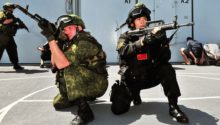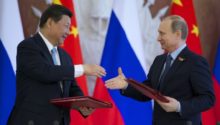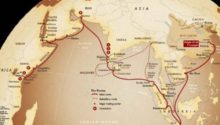contributors
Augusto Soto

Dialogue with China Project, Barcelona (Spain), Director
all articles


Brussels, Europe’s political and defense headquarter, hit by the Islamic State (ISIS) in spite of months of the highest antiterrorist surveillance is not an «existential threat», according to Obama, but Russia and China, highlights US Secretary of State Ashton Carter, are. The statement brings to the fore the evolving issue of security to the Beijing-Moscow-US triangle.


This year Moscow and Beijing celebrate the 15th anniversary of the Treaty of Good-Neighborliness and Friendly Cooperation signed in 2001, just a few months before the September 11, a Eurasian geopolitics watershed leading to the peak and subsequent declining of US power. Ever since China and Russia have been actively contributing to a multipolar world which right now is at a dramatic juncture…


Xi Jinping’s recent visits to Saudi Arabia, Egypt and Iran and his upcoming visit to the Czech Republic in March remind us of more challenges for the «One Belt, One Road» (OBOR) policy now than when it was announced in 2013…


Over the last few weeks, the announcement of President Xi Jinping’s plan for modernizing China’s military, including building a second aircraft carrier, coupled with the recent announcement of China’s first-ever military support facility in East Africa’s Djibouti, revived the somehow repetitive but always interesting question on the «real intentions» of China…


Beijing has promised to act following decapitation of a Chinese national on ISIS controlled territory and the killing of three executives of a Chinese construction company in Mali, claimed by Al-Mourabitoun jihadist Al-Qaida related group. The news shocked Chinese citizens, who are regularly hit by Xinjiang Uyghur radicals who have fought a low-level bloody insurgency against Beijing's rule for years…


«One Belt and One Road» (OBOR) policy (or Silk Road Economic Belt and the 21st Century Maritime Silk Road) heralding further integration of China with South East Asia, Central Asia and Russia, Europe, the Middle East and Eastern Africa is gaining renewed momentum and further international attention. Following recent attacks in Paris, Turkey, Lebanon, Sinai together with increase of terrorist activity in several countries included or bordering OBOR’s space, sophisticated technical, diplomatic and defence factors are bound to influence the initiative and its very significance…


As dangerous as Western misinterpretation of its co-responsibility in perpetuating the current Syria crisis is its lack of understanding of the larger macro-region Syria role as a link between the Middle East and Southern Eurasia. Russian military operation in Syria might transform the much needed understanding of the macro-region…


The old saying stating that each new generation had to learn history in order not to commit the same mistakes has become quite topical. Current events are broadcasted to people who read fewer books than ever and increasingly rely on fast-changing virtual content containing unconcealed US propaganda…


Over the last few months we’ve heard several voices accusing Russia-China duo of possible Anti-Western sentiment. In fact this non-ideological and non-invasive relationship of the two close neighbours faces complexities of its own. Above all, this union has to try its best to refrain from appearing as an antagonist of western powers, EU in particular, and to show that it has a potential for making contribution to the Eurasia’s stability from the eastern side while promoting a necessary multipolarism…


Recent Tokyo’s bellicose attitude pushes Japan into alienation and relative isolation vis-à-vis China’s growing global presence…



